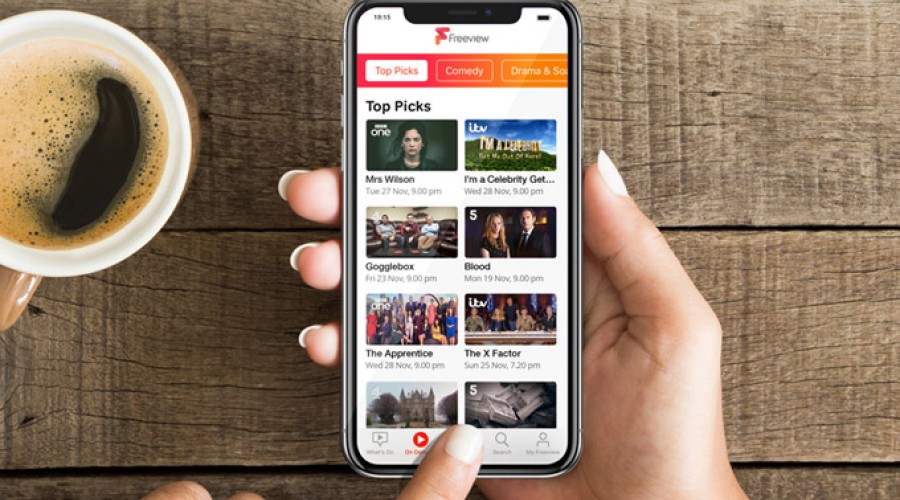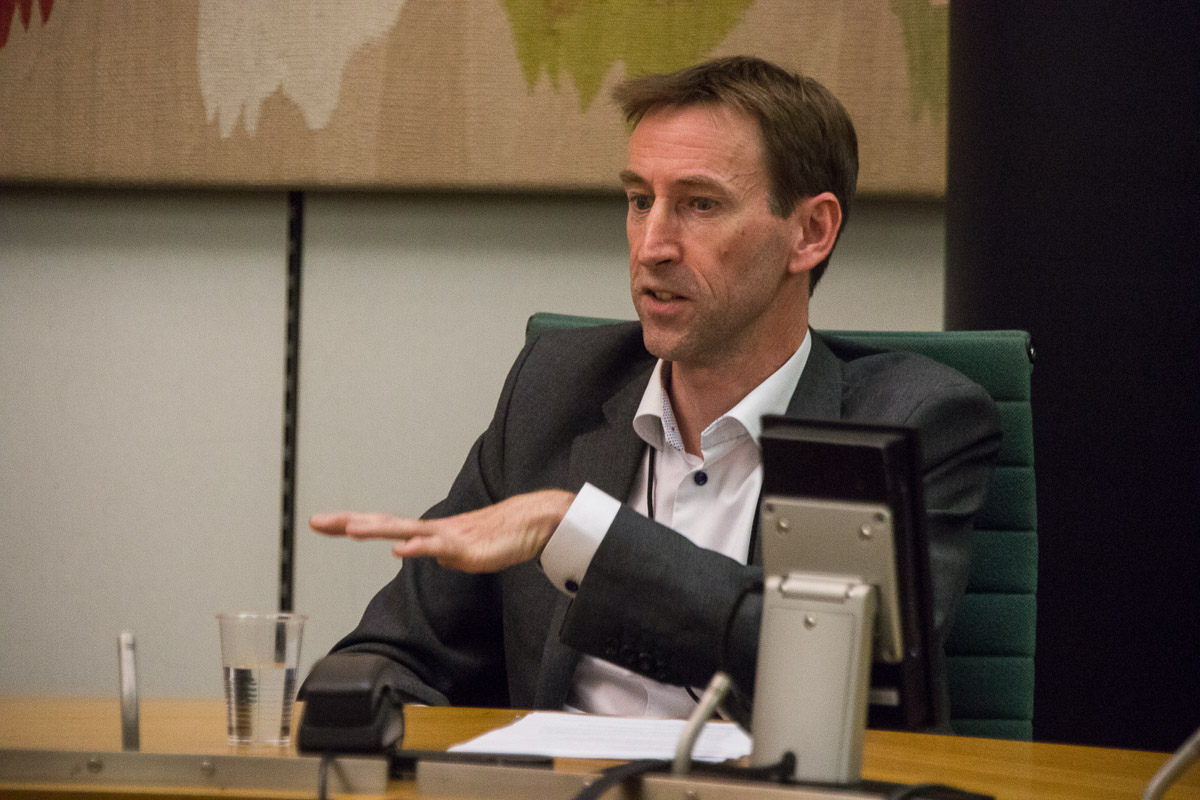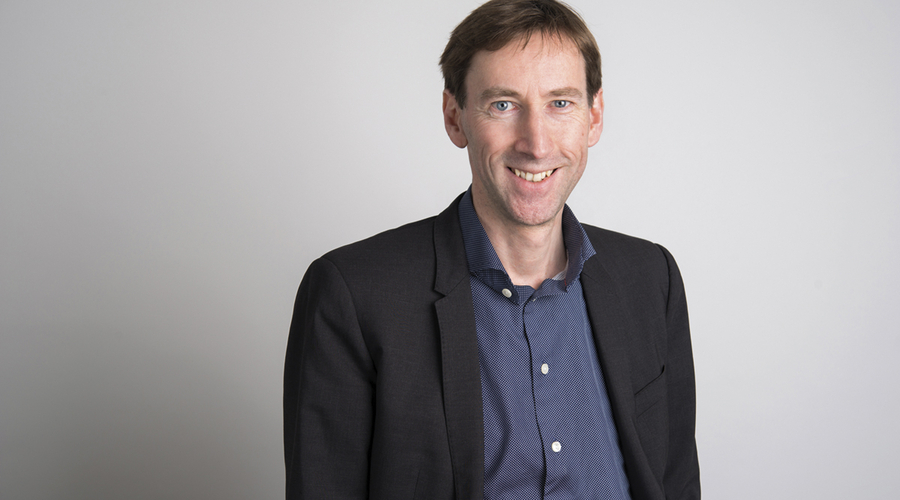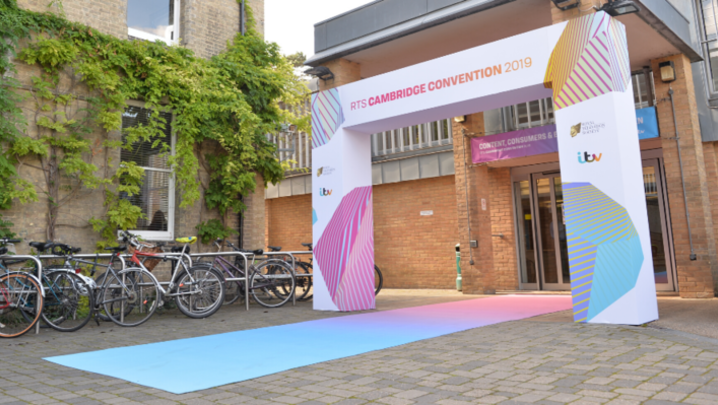As Freeview rolls out its new mobile app, Steve Clarke talks to the man behind the initiative, Jonathan Thompson, CEO of Digital UK.
The UK’s most successful digital television platform, Freeview, passed another milestone last month, when it debuted its mobile app. Users can now stream live shows from the BBC, ITV and Channel 4 plus on demand content from BBC iPlayer, ITV Hub, All 4, My5, and UKTV Play.
As the nation’s public service broadcasters dwell on the growing impact of Netflix, Amazon and YouTube, the move could be pivotal in ensuring that British PSBs don’t become stranded as young people’s video consumption moves more and more online.
It is a threat that Jonathan Thompson, the CEO of Digital UK, the organisation that runs Freeview, needs no reminding of.
When we meet, he is just back from CES , the consumer technology trade show, in Las Vegas, where he tells me that Google reigned supreme.
“Everywhere I went, Google was ubiquitous,” he says. “But, frankly, I didn’t see many technological innovations at the event.”
This may be just as well at a time when Freeview, which launched back in 2002 and not long after ITV Digital imploded, is considering how best to meet the challenges that lie ahead.
Thompson, a former Channel 4 and Ofcom executive who joined Freeview as CEO five and a half years ago, appreciates the competitive pressures on traditional broadcasters.
He is, however, convinced that Freeview is part of the solution, provided that its shareholders – all the UK PSBs (bar Channel 5), Sky and Arqiva – continue to leverage the platform’s considerable strengths.
Lately, it has become fashionable to talk of collaboration between the PSBs and other incumbents: last year, for example, Channel 4 and Sky signed a programme-sharing agreement.
But Freeview, present in around 17 million UK homes, embodies the value of broadcaster partnerships from a time when Netflix was still delivering DVDs in the post.
“People forget that Freeview is the biggest TV platform in this country.”
“It gave people an easy, simple and affordable path to digital TV. Freeview played an important role in making switchover as painless as possible,” recalls Thompson. “People forget that it is the biggest TV platform in this country.”
Not only that. Remarkably, Freeview is growing, helped by people turning away from so-called full-fat pay-TV subscriptions.
“If anything, we’ve gained from the growth of the streaming services,” he says. “We see the growth of the SVoD players as an opportunity. They allow people to buy a more personalised content package at a more attractive price point.
“It’s the British version of cord cutting: Freeview plus Netflix or Amazon. That’s one of the upsides and opportunities of Freeview, the ability to combine free, good-quality public service TV with the opportunity to dip into whichever VoD service you want.”
Thompson claims that, over the past three years, the number of people who use Freeview-enabled TV sets as their main set has increased by 1 million.

And in Freeview homes, of course, the PSB channels are more popular than they are in Sky or Virgin homes.
From his perspective, there are other advantages, too: “Freeview’s universality has helped the competitive dynamic of the marketplace. It’s provided a natural competitive constraint to Sky and Virgin and, to a certain extent, Netflix and Amazon.”
But Freeview needs to move with the times. Its catch-up service, Freeview Play, launched in 2015.
The new mobile app made its debut on Apple devices on 22 January. An Android version will follow in the spring.
The aim is to “provide a seamless, aggregated, easy-to-navigate experience that feels like normal TV,” explains Thompson, adding:
“I see it as a natural complement to the broadcast experience. To a certain extent, Freeview has always been a fast follower as a platform. We don’t seek to be the leading-edge innovator.
“The nature of the Freeview proposition appeals to a mass market who wants TV to be easy. I am not pretending that this is a first, but I think it makes a lot of sense for Freeview to have it.
"Viewers increasingly expect platforms to have a mobile complement in the way that Sky and Virgin do. It gives viewers more flexibility and choice. It holds true to the values of Freeview.”
The app includes curated on-demand recommendations, search capability, a 15-day TV guide (with access to the previous week’s schedule plus the week ahead), the ability to set reminders, and the ability to set channels as favourites.
Over time, the aim is to expand the range of content available from non-PSB broadcasters.
But is it, perhaps, a little late to be launching a Freeview app? “It’s probably later from a consumer perspective than we’d ideally like,” concedes Thompson.
“We have to speed up the process of innovation so that we’ve got more to talk about each year because the pace of change in the marketplace is accelerating."
“We needed to establish Freeview Play first. This is the natural next step. It’s not like it’s too late to market. The opportunity is still there to grow and develop the Freeview brand and experience.

“We have to speed up the process of innovation so that we’ve got more to talk about each year.… That is critical because the pace of change in the marketplace is accelerating.
"It’s a banal thing to say, but you can’t stand still as a platform or have innovations every four or five years and remain relevant.”
Only time will tell if the app is critical in persuading young people to view more public service broadcasting content.
As a former strategy director at Channel 4 (where he represented the broadcaster on the Freeview board) and Ofcom, Thompson has long held a front-row seat in assessing how PSBs respond to the activities of rivals.
What is happening in today’s online space represents competition of a different order to how Channel 4 responded to BSkyB and the growth of other multichannel operators.
"The obvious big trend we are seeing at the moment... is that TV is turning into a global market."
Thompson puts it like this: “The obvious big trend we are seeing at the moment, and it’s probably the most significant thing that’s happened to the TV sector in decades, is that TV is turning into a global market.
“That’s what Amazon and Netflix are doing. Yes, they are US players but they see themselves as global platforms. Their strategy is a global one. It’s built and distributed across multiple territories.
Their approach to monetisation, distribution and to content investment is to approach them globally. This has never happened before in television.
“It’s a more profound change than going from analogue to digital or going from broadcast to connected. The challenge for Freeview, as a national operator, is how do you respond to that.”
One way is to “recognise our core strengths” and “to leverage the strengths we have”.
He says this means that “we have to be better at what we’re good at. Freeview is about simplicity, ease of use, brand resonance and aggregation of content in a way that people are familiar with.”
Ofcom has already given its backing to greater collaboration between the PSBs. Thompson agrees that this approach is key if the PSBs are to retain their pre-eminent position in the UK:
“Freeview is a really good example of collaboration. We are not an exclusive vehicle of collaboration but we have been a successful model of collaboration.
“We’ve demonstrated how that collaboration can move forward in the connected world. We are one part of [the PSBs’] strategic response to these changes.”
Whether ITV and the BBC should become partners in a UK SVoD service is open to question.
Thompson thinks that working together on a SVoD proposition of some type makes sense – “whether all parties need to be investors in it or one party takes a lead.… It doesn’t necessarily require them all to do it as a joint venture but, as a consumer proposition, consumers can see the benefits of aggregation.”
He is in no doubt that, in the era of social media, universally delivered public service broadcasting is more important than ever.
The ability of the BBC, ITV and Channels 4 and 5 to deliver impartial news is vital. So, too, is the need for these broadcasters to invest in other national and regional content, including children’s shows.
Thompson concludes: “The delivery of those objectives is more challenging because there is more choice. It’s harder because you can no longer rely on the distribution advantage that PSBs had in the past. You’re fighting for every eyeball.”
With the Freeview app up and running, the hope is that the fight might get a little easier.




